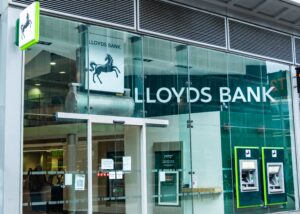Lloyds Bank profit poised to be retained to set aside millions to cope with cost of living defaults


A build up of reserves to cope with an expected jump in loan defaults and a slow down in the mortgage market is expected to have held back profits at Lloyds Bank last year, results out on Wednesday could show.
Britain’s biggest mortgage lender is poised to be the latest bank to underwhelm markets in what has been a slim bank earnings season.
“Concerns over the economic outlook and its heavy reliance on the UK domestic market” has pegged back Lloyds’s shares, according to Michael Hewson, chief market analyst at CMC Markets UK.
“Despite these concerns the bank has consistently outperformed while increasing profits to the point its more profitable now that it was back in 2019 when the shares were much higher,” he added.
Its shares have jumped just 10 per cent in 2023 so far.
Lenders have re-started setting cash aside to help absorb losses stemming from a jump in borrowers being unable to repay loans as a result of their finances being squeezed by the cost of living crunch.
Barclays’s profits come in below expectations, down eight per cent, due to a £500m reserve build up, sending its shares to the bottom of the FTSE 100 after it announced results last Wednesday.
NatWest’s shares also slid on Friday when it told investors of a £337m loan loss provisions.
Investors will be combing through Lloyds’s results to get a sense of how much it has been weighed down by potential buyers fleeing the property market in response to higher mortgage rates.
Mortgage lending has become a big part of Lloyds’s business after it took over Halifax in the aftermath of the global financial crisis in 2009.
The Bank of England has hiked interest rates 10 times in a row to a 15 year high of four per cent in response to the biggest inflation surge in more than 40 years.
While that has cooled demand for mortgages, it has allowed the UK’s largest banks to charge more for loans, widening the sector’ s net interest margin, a key source of income.
Calls for a windfall tax on UK banks to help raise cash for the government have gathered pace of late. The sector has been subjected to an additional eight per cent surcharge on top of corporation tax, although that levy is poised to drop to three per cent in April to offset the effects of the six point corporation tax rise.
Lloyds’s latest results show its pre-tax profits in the three months to September fell 26 per cent to £1.5bn.
Read more:
Lloyds Bank profit poised to be retained to set aside millions to cope with cost of living defaults
